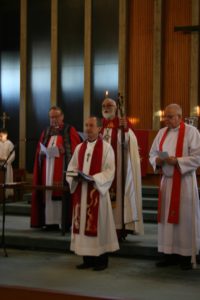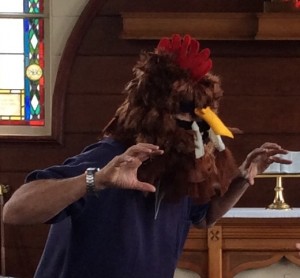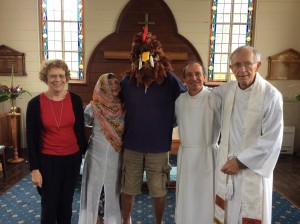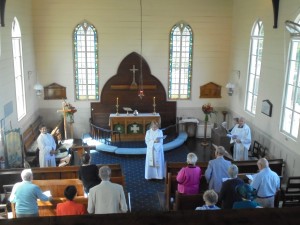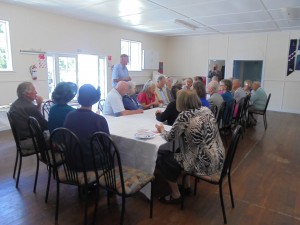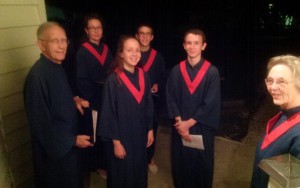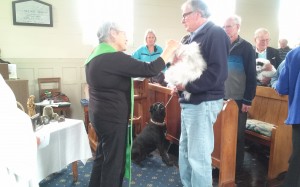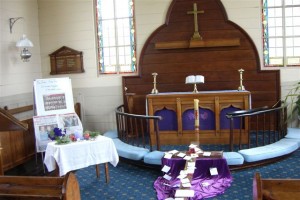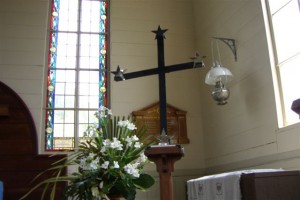Reflection given by Jacqui Knight on Sunday, 4 October 2009:
‘Apprehend God in all things,
for God is in all things.
Every single creature is full of God,
and is a book about God.
Every creature is a word of God.
If I spent enough time with the tiniest creature–
even a caterpillar–
I would never have to prepare a sermon
so full of God is every creature’
(Those words were written by Meister Eckhart, a 13th century Christian mystic)
“So full of God is every creature.”
My parents loved Nature. They taught my three brothers and me to have respect for flowers, trees, birds and other animals. We had dogs as we grew up, always had a succession of dogs. For a long while, too, there were tumbler pigeons and chooks.
Funnily enough, though, there were some things my mother hated. For such a kind and gentle person, it is strange to look back and recall how much she hated some things. Some animals, and some plants.
Each time she saw mangrove swamps she would always remark how ugly they were. I didn’t ask why–just accepted that mangrove swamps were… ugly.
When I was in the garden she would often comment how she hated oxalis with a vengeance. Dock, too, was another enemy. I grew up thinking that mangrove swamps, dock and oxalis, among other things, were bad.
And when shopping it was the norm to seek perfection, the big, red perfectly-shaped apples were sought after, while the little one with flaws or a bug in the middle were rejected.
My thinking began to change about 35 years ago when I became a mother. Wanting to give my children the best of everything I began to look for more natural choices. I started to learn more about relationships.
I started to realise that an apple that had a live bug in it was probably safer than one that no insects would go near, because they had had a dose of poison. I began to plant a few more vegetables so that some could be sacrificed to birds and insects.
Each time I see a kawakawa bush (it adds a wonderful peppery flavour to food), I think of the Maori adage that says select a kawakawa leaf that has insect damage, because the insects know the best ones to eat!
I think it was over at Rawene that I began to understand about mangrove swamps, sorry, wetlands is the PC expression today, and their place in Nature. Mangroves become prolific where there has been a large amount of pollution or sediment into the bay, and while they act as a nursery for marine life, they also purify the polluted water. Spend some time looking around a mangrove forest and you can learn so much about marine ecosystems.
On my farm I learned that dock grew in areas where the soil has been badly compacted and in fact with its long taproot system it brings valuable minerals up to the surface to help restore the texture and health of the damaged topsoil.
We are too judgmental! What right do we have to decide that something is ‘bad’ or ‘ugly’?
Over the last 30 years I have been learning more about insects. It began with an interest in the monarch and has spread to other butterflies. The more I learn, the more my interest grows. I am learning more and more about host plants and predators and parasites. It is all fascinating.
Did you know that the first monarch was seen in this country the year after the Treaty of Waitangi was signed? Did you know that scientists believe they flew/blew here from North America?
And it wasn’t until the Swan plant arrived that the monarch was able to breed here. But did you know that the Swan plant comes from Africa?
Do you know how the Swan plant came to New Zealand? We believe settlers coming from Britain round the Cape of Good Hope went ashore and bought a cushion, pillow or mattress which had a swan plant down filling. At some time after they had settled here, the item was no longer needed, and dumped. Amongst the down was a few Swan plant seeds and soon the plant was growing, and the Monarchs could breed.
As my interest grew I began to dislike the predators and parasites that attack the monarch butterfly. Did you know there is a little wasp that lays its eggs inside a newly formed chrysalis? Instead of a butterfly forming 40 or 50 wasps will emerge from each one, and leave to attack other chrysalises. I began to hate these predators and parasites with a vengeance.
However, one day it occurred to me that the relationships are just as they are meant to be. Not all caterpillars are destined to be butterflies; they also provide food for other species. One species is not meant to be predominant. As one species thrives another one struggles. For instance where we have healthy seawater we will have ample fish. Where there are plentiful fish you will find plenty of fishermen, birds, and marine mammals. An area becomes too popular, the fish become less, so the fishermen go away to find new areas. And so it goes on.
It’s all about balance. There are high and lows. Nature swings in a boom or bust cycle. It is the way it is meant to be.
Sadly, however, nature is affected badly by one of our worst vices: greed. A classic example of this was seen in the media this week: a dairy farmer not content to own one farm and make a reasonable living through hard work, but who owns many farms and does not have the time or respect for the cows he owns.
It is heartening to me to see that more and more people are becoming aware of environmental issues and our need for wise stewardship of the planet. People are being gentler, people are generally showing respect and responsibility for other beings, animals and plants. We’re not quite there yet, but more and more people are beginning to make a difference.
It wasn’t long ago that we would have shrugged our shoulders and said about that farmer that ‘that’s life’, but it’s different today, we do take action.
You may remember I mentioned how my mother hated oxalis. If you look around the churchyard outside, you will see a bright little pink flower popping its head up all over the lawn. That’s oxalis! It’s a stand-out plant, adding to this church’s charm. And only people who think lawns should be only grass, and green, and neat, would be bothered by it. Each time I see that pretty pink flower, I think of my mother.
Today I hope that we can leave this church and reflect on how we can improve our own relationship with Nature. To have respect for all that is around us, the green leaves, the flowers, the trees. The plant in the wrong place. Insects and birds, pets and farm animals. And those in the wilderness too. We know in our hearts if we are doing the right thing by Nature. We only need to think of how God asked us to behave, in the way that we care for others.
